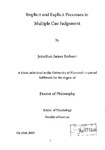Implicit and Explicit Processes in Multiple Cue Judgement
| dc.contributor.author | Rolison, Jonathan James | |
| dc.contributor.other | Faculty of Science and Engineering | en_US |
| dc.date.accessioned | 2013-09-19T13:54:19Z | |
| dc.date.available | 2013-09-19T13:54:19Z | |
| dc.date.issued | 2009 | |
| dc.identifier | NOT AVAILABLE | en_US |
| dc.identifier.uri | http://hdl.handle.net/10026.1/1899 | |
| dc.description.abstract |
Making judgements often involves integrating multiple pieces of information, or cues, in the environment. While experts, such as physicians, are able to make accurate judgements from multiple cues, they often have poor insight into how they make their inferences. This provides some indication that judgement is influenced by knowledge that is implicit and inaccessible to verbal report. In the present thesis, the cognitive processes involved in multiple cue judgement were explored by training participants on a small number of novel cues using the multiple cue probability learning (MCPL) paradigm. In a training phase, participants predicted a criterion and received outcome feedback in response to each judgement. Learning and judgement in these tasks is often assumed to draw on explicit hypothesis-testing processes. However, a great deal of research suggests that implicit as well as explicit processes can contribute to performance on complex tasks. In eight experiments, several methods were used to examine the role of explicit and implicit processes in multiple cue judgement. While concurrent working memory loads failed to disrupt judgements after learning, we nevertheless found clear evidence that explicit processing is involved in the learning of negative, but not positive cues. Performance on such tasks was correlated with individual differences in working memory capacity, as well as measures of explicit knowledge obtained in the learning process. The results are discussed with respect to dual process theories of learning, judgement, and reasoning. The findings of the present thesis indicate that multiple cue judgement is best viewed within a dual process framework. | en_US |
| dc.language.iso | en | en_US |
| dc.publisher | University of Plymouth | en_US |
| dc.title | Implicit and Explicit Processes in Multiple Cue Judgement | en_US |
| dc.type | Thesis | |
| plymouth.version | Full version | en_US |
| dc.identifier.doi | http://dx.doi.org/10.24382/3806 |
Files in this item
This item appears in the following Collection(s)
-
01 Research Theses Main Collection
Research Theses Main


